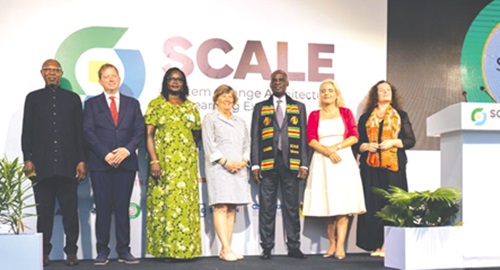The Ministry of Education has signed a partnership agreement with an educational consortium and other partners to provide $118.8 million grant to support foundational learning.
The partnership allows System Change Architecture for Learning Excellence (SCALE) and other partners that form the consortium to provide $40 million; the Global Partnership for Education (GPE) will contribute $40 million; a multi-donor trust fund is donating $7.4 million, with GPE systems transformation offering a grant of $31.4 million.
Purpose of investment
The support is to improve foundational learning and ensure that every child receives education. The funding will be invested in the Ministry of Education’s flagship Ghana Accountability for Learning Outcomes Project (GALOP).
The investment, an additional funding two (AF2) of GALOP, will seek to improve foundational learning, including basic numeracy and literacy skills, support emotional and social wellbeing, and increase children’s access to education across the country.
Intervention areas
The GALOP AF2 will support four main areas - Strengthen teaching and learning through support and resources for teachers; strengthen school support, management and resourcing; strengthen accountability systems for learning; and technical assistance, institutional strengthening, monitoring and research.
Using a results-based financing approach, the World Bank will act as GALOP’s grant agent by disbursing funds to the Ministry of Education, which is responsible for delivery based on the achievement of pre-determined performance-based conditions
With an emphasis on evidence-based approaches to education, the funders behind SCALE bring a breadth of international expertise to support local, regional, and national level improvements in Ghana’s education system.
The Minister of Education, Haruna Iddrisu, who signed the agreement on behalf of the ministry, said, “this is an opportunity for us.
With a shared vision, a shared partnership, and a shared innovative financing for education. And it could not have been done at a better time.”
“Ghana has every reason to celebrate the impact made under the investment of GALOP, and SCALE is an extension of this,” he added.
Mr Iddrisu gave the assurance that, aside from the prudent and judicious use of the resources, the new government recognised that, “foundational learning is key to future success, not just academic success, but personal and professional development of the young ones.”
Partners
The Operations Manager and acting Country Director for the World Bank, Michelle Keane, said the SCALE objectives and the World Bank's education strategy for Western Central Africa were fully aligned around equitable access to quality education for every child and lifelong learning opportunities for all.
He said by investing in education together, “we seek to empower not only individuals, but also to begin preparing young people’s access to better jobs, which will drive prosperity and fight poverty.”
Mr Keane said the bank was looking forward to continue the World bank’s International Development Association’s (IDA's) efforts, working closely with all partners, and under the leadership of the government, to fight together for the elimination of learning poverty and the future of learning for all children in Ghana.
One of the primary foundation partners leading SCALE, Simon Sommer, Co-CEO of the Jacobs Foundation, said, “besides the financial commitment, the SCALE partnership offers the expertise of a broad range of organisations who have helped to transform the way in which evidence is applied to education.
“SCALE will build on the successes of other international models, including the Child Learning and Education Facility (CLEF) in Côte d’Ivoire which has been recognized by the World Bank.,” he said.
He added that in Ghana, the foundation expected two million children to benefit from evidence-based research and insight that will extend across 100 cocoa districts.
On his part, the UBS Optimus Foundation CEO, Tom Hall, said, "we firmly believe that one of the most effective ways to give with maximum impact is collectively.
Greater coordination boosts efficiency by avoiding duplication, streamlining processes, and leveraging each partner’s unique strengths and flexibility.
“Together, we can overcome the limitations of working in silos and support a programme that addresses multiple root causes at once," he said.
The CEO of Fondation Botnar, Andrea Studer, added that “at Fondation Botnar, we believe education systems must help young people thrive together in a changing world.”
The Community Development Manager of Mondelez International, Matilda Broni, who spoke for the industry players, stated that from an industry perspective, investing in education was not just a philanthropic gesture.
“It is a strategic commitment to the sustainable development of the communities that sustain our industry.
The industries recognise that foundational learning is the bedrock of personal empowerment, economic resilience, and long-term societal transformation,” she said.
Writer’s email: severious.dery@graphic.com.gh

